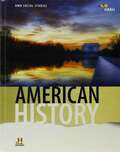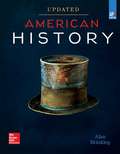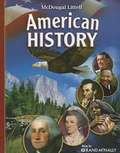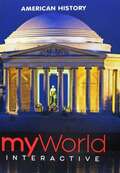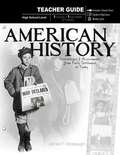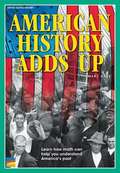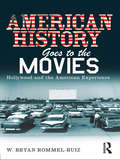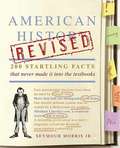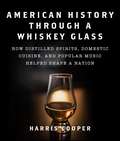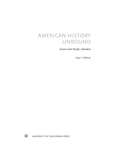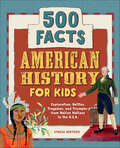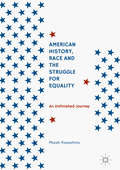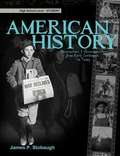- Table View
- List View
American History
by Michael B. Stoff James West Davidson Jennifer L. BertoletIn 'They Say,' James West Davidson recounts the first thirty years in the passionate life of Ida B. Wells--as well as the story of the great struggle over the meaning of race in post-emancipation America. Davidson captures the breathtaking and often chaotic changes that swept the South as Wells grew up in Holly Springs, Mississippi: the spread of education among free blacks, the rise of political activism, and the bitter struggles for equality in the face of entrenched social custom. When Wells came of age she moved to bustling Memphis, where her quest for personal fulfillment was thwarted as whites increasingly used race as a barrier to separate blacks from mainstream America. Davidson traces the crosscurrents of these cultural conflicts through Wells's forceful personality, intertwining her struggle to define herself with her early courageous, and often audacious, behavior. When a conductor threw her off a train for refusing to sit in the segregated car, she sued the railroad--and won. When she protested conditions in segregated Memphis schools, she was fired--and took up journalism. And in 1892, when an explosive lynching rocked Memphis, Wells embarked fully on the career for which she is now remembered, as outspoken anti-lynching writer and lecturer. Period photographs from postcards, newspapers, and Wells's own diary further engage readers in this dynamic story. Richly researched and deftly written, the book offers a gripping portrait of the young Ida B. Wells, who directly encountered and influenced the evolving significance of race in America.
American History (AP US History Series)
by Alan Brinkley"[The] perfect guide to the latest version of AP United States History curriculum. The new AP Edition ... fully addresses the revised AP U.S. History Curriculum and provides students with the guidance and support they need to master the key concepts, themes, historical thinking skills, and the new AP US History Exam"--Back cover.
American History (New York Edition)
by Robert Dallek Donna M. Ogle Jesus Garcia C. Frederick RisingerAmerican History uses four key strategies to help one become a more successful reader of history, and more knowledgeable about their state's standards. These strategies are: set a purpose for reading, build your social studies vocabulary, use active reading strategies and check your understanding
American History (myWorld Interactive )
by Michael B. Stoff James West Davidson Jennifer L. BertoletNIMAC-sourced textbook
American History - Teacher Guide
by James P. StobaughThis convenient teacher's guide is all a parent or teacher needs to easily grade the 10th grade student assignments for American History: Observations & Assessments from Early Settlement to Today. Assignments with answers, learning objectives, grading criteria, and short essay questions are included. This course is designed for a student to practice independent learning. The guide will assist teachers by offering: 34 chapters for 34 weeks of study Chapters include 5 lessons taking approximately 30 minutes each The final lesson of the week is an exam covering the week's instruction Student questions are organized in the back for easy use in testing and review Teachers, parents, or students can grade assignments daily or weekly As the teacher, you will enjoy partnering with your student as he or she processes American history while developing or strengthening a Christian world view.
American History Adds Up: Set of 6 (Navigators Ser.)
by Marc Gave Alison AdamsNIMAC-sourced textbook
American History Goes to the Movies: Hollywood and the American Experience
by W. Bryan Rommel RuizWhether they prefer blockbusters, historical dramas, or documentaries, people learn much of what they know about history from the movies. In American History Goes to the Movies, W. Bryan Rommel-Ruiz shows how popular representations of historic events shape the way audiences understand the history of the United States, including American representations of race and gender, and stories of immigration, especially the familiar narrative of the American Dream. Using films from many different genres, American History Goes to the Movies draws together movies that depict the Civil War, the Wild West, the assassination of JFK, and the events of 9/11, from The Birth of a Nation and Gone with the Wind to The Exorcist and United 93, to show how viewers use movies to make sense of the past, addressing not only how we render history for popular enjoyment, but also how Hollywood’s renderings of America influence the way Americans see themselves and how they make sense of the world.
American History Revised: 200 Startling Facts That Never Made It into the Textbooks
by Seymour Morris Jr.This spirited reexamination of American history (1776-2000) digs deep into our past to expose 200 startling facts that never made it into the textbooks, and highlights how little-known individuals and events played surprisingly influential roles in the great American story. We tend to think of history as settled, set in stone, but American History Revised is filled with evidence that American history is filled with ironies, surprises, and misconceptions. As author Seymour Morris, Jr. colorfully illustrates through the 200 historical vignettes that make up this book, much of our nation's past is quite different - and far more remarkable -- than we thought. Here we learn that in 1932, the U.S. Navy staged a mock attack on Pearl Harbor that resulted in the conclusion that the entire fleet of ships and planes stationed there were vulnerable to being wiped out on a Sunday morning. The Navy swore such an event could never happen and then forgot about it. The Japanese, however, noticed. And on December 7th, 1941, they copied the military exercise exactly. We also discover that: * America's largest corporation has never appeared on a Fortune 500 list * The two generals who ended the Civil War weren't Grant and Lee * The #1 best-selling American book of all time was written in one day * The Dutch made a bad investment buying Manhattan for $24 * Two young girls aimed someday to become First Lady - and succeeded * Three private financiers saved the U.S. from bankruptcy. Organized into ten thematic chapters, American History Revised plumbs American history's numerous inconsistencies, twists and turns to make it come alive again. Written in a lucid, often puckish style and backed by serious scholarship, extensive footnotes, and 50 illustrations, this book will leave readers astonished and entertained.
American History Since 1865-Student Pages-Semesters 2
by K12 Inc.Study guides, worksheets and assessment for students to take them through the American History since 1865.
American History Stories...Volume I: The Shot Heard 'Round the World
by Mara L. PrattThis is the story of the American Revolution as you have never read it before. Volume One is a photo-reproduction of an original history book used in 1889 to teach our children the grandeur of the America vision. These pages contain the stories of countless men, women and children who pledged their lives, liberty and sacred honor to the grand experiment in freedom; a revolution that would change the world forever.
American History Through a Whiskey Glass: How Distilled Spirits, Domestic Cuisine, and Popular Music Helped Shape a Nation
by Harris CooperExperience American history like never before with this unique, informative, and fun guide for history buffs, whiskey enthusiasts, folks who like to cook at home, and fans of popular music.American History Through a Whiskey Glass presents a unique perspective on American history. It describes how bourbon and rye whiskey played a role in the most important events in American history, including the voyage of the Mayflower, George Washington&’s failed and successful political campaigns, the Civil War, pioneers moving west, Prohibition (of course), plus many more into the twenty-first century. It does so with descriptions of historical events but also with amusing anecdotes and humorous quotes from the historical figures themselves. The book carefully aligns five elements: a narrative about whiskey&’s role in eight periods of American historydescriptions and tasting notes for American whiskeys that represent distilled spirits in each historical periodtutorials on how whiskey is produced and its numerous varietiesperiod-specific food recipes drawn mostly from historical cookbooksplaylists of the popular music during each period The book gives readers an integrated and entertaining perspective on popular culture in America at different times, revealing how Americans have politicked, drank their native spirits, ate, and sang. But it does more; readers will not only learn about America&’s history, they can experience it through numerous illustrations, whiskey tasting, food, and music. It provides an opportunity for readers to be involved in a truly immersive approach to life-long learning . . . and it&’s fun.
American History Unbound
by Gary OkihiroA survey of U.S. history from its beginnings to the present, American History Unbound reveals our past through the lens of Asian American and Pacific Islander history. In so doing, it is a work of both history and anti-history, a narrative that fundamentally transforms and deepens our understanding of the United States. This text is accessible and filled with engaging stories and themes that draw attention to key theoretical and historical interpretations. Gary Y. Okihiro positions Asians and Pacific Islanders within a larger history of people of color in the United States and places the United States in the context of world history and oceanic worlds.
American History for Kids: Exploration, Battles, Tragedies, and Triumphs—from Native Nations to the U.S.A. (500 Facts)
by Stacia DeutschInteresting facts that teach kids ages 8 to 12 about American historyKids don't need long, boring textbooks to learn about history. Starting with America's earliest inhabitants in 20,000 BCE and finishing in the modern day, American History for Kids helps them explore America's past through memorable and exciting facts that they will love to share.This engaging look at American history for kids age 8-12 includes:500 facts—This book introduces kids to many of the incredible things that have happened in America, one informative tidbit at a time.The complete timeline—Kids will learn all about important people, places, and events across thousands of years of American history.A leg up on learning—These facts provide kids with a head start on the topics they'll be covering in class, plus things they might not learn in school.Help history come alive with the incredible facts inside this top choice among American history books.
American History, Guided Reading Workbook: Guided Reading Workbook (American History Ser.)
by Houghton Mifflin Harcourt StaffNIMAC-sourced textbook
American History, Race and the Struggle for Equality: An Unfinished Journey
by Masaki KawashimaPowerfully synthesizing major currents in the field, this book addresses the issue of inequality across American politics and society, using race as a lens for the exploration of major themes in American history. It considers the concept of race as a social construction, against the background of the historical struggles for "fairness" in a society based on the framework of democracy, whose principle is that majority's consent be necessary for the fulfillment of "justice. " Foregrounding problems of race, capital, and political economy, it particularly examines the connections between race and class, the relationship of slavery and national politics, and the distinctive intellectual framework that Americans have developed to discuss "race. " Offering a detailed account of civil rights legislation, an overview of immigration law and policy, and comprehensive overviews of debates about affirmative action, immigration, and the causes and solutions to racialized urban poverty, this book emphasizes what is distinctive about the United States and offers a unique comparative framework for thinking about America's racial past.
American History-Student
by James P. StobaughRespected Christian educator, Dr. James Stobaugh, offers an entire year of high school American history curriculum in an easy to teach and comprehensive volume. American History: Observations & Assessments from Early Settlement to Today employs clear objectives and challenging assignments for the tenth grade student. From before the birth of our republic to the principles of liberty, American history trends, philosophies, and events are thoroughly explored. The following components are covered for the student: Critical thinking Examinations of historical theories, terms, and concepts History makers who changed the course of America Overviews and insights into world views. Students will complete this course knowing the Christian influences that created a beacon of hope and opportunity that still draws millions to the United States of America. This 384-page student resource should be used in conjunction with the American History: Observations & Assessments from Early Settlement to Today for the Teacher. British History and World History are included in this comprehensive high school history curriculum for 10th, 11th, and 12th grades offered by Dr. James Stobaugh and Master Books.
